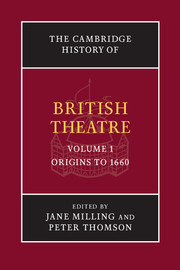Book contents
- Frontmatter
- PART I PRE-ELIZABETHAN THEATRE
- PART II ELIZABETHAN THEATRE
- PART III JACOBEAN AND CAROLINE THEATRE
- 13 Working playwrights, 1580–1642
- 14 Theatre and controversy, 1603–1642
- 15 The Stuart masque and its makers
- 16 Clowns, fools and knaves: stages in the evolution of acting
- 17 Thomas Middleton's A Game at Chess: a case study
- 18 The condition of the theatres in 1642
- 19 Theatre and Commonwealth
- Works Cited
- Index
- References
14 - Theatre and controversy, 1603–1642
from PART III - JACOBEAN AND CAROLINE THEATRE
Published online by Cambridge University Press: 28 March 2008
- Frontmatter
- PART I PRE-ELIZABETHAN THEATRE
- PART II ELIZABETHAN THEATRE
- PART III JACOBEAN AND CAROLINE THEATRE
- 13 Working playwrights, 1580–1642
- 14 Theatre and controversy, 1603–1642
- 15 The Stuart masque and its makers
- 16 Clowns, fools and knaves: stages in the evolution of acting
- 17 Thomas Middleton's A Game at Chess: a case study
- 18 The condition of the theatres in 1642
- 19 Theatre and Commonwealth
- Works Cited
- Index
- References
Summary
Two kinds of theatre were in a state of abeyance during the first year of King James's reign. The first was commercial performance in London, the playhouses having been closed when Elizabeth was dying in 1603, and remaining closed on account of increased plague deaths following James's accession. The second was ceremonial theatre, in that James's coronation pageant had to be postponed until the following year. This too was due to the plague, though it later became clear that James was also personally somewhat unwilling to take part in this public show. The reasons for this absence of theatre in 1603–4 tell us something about how theatre was perceived at the time. Closure on a monarch's death was a measure of the authorities' fearfulness of theatre as a potential instigator of disorder. Not only were plays liable to contain ‘dangerous matter’ (Henry Herbert's phrase; see again below) that might put ideas into people's heads; they also, regardless of their content, presented the occasion for very large assemblies of people to gather, including those at the lower end of the social scale. Any large gathering might be regarded in times of stress as a riot waiting to happen, and it was not uncommon for theatres to be closed at other times of unrest, as, for example, during the anti-alien riots of summer 1592. When James Burbage first tried to open the Blackfriars for public performance in 1596, residents voiced the same fear as the London authorities, and successfully petitioned against it on the grounds that it would lead to ‘the great resort and gathering together of all manner of vagrant and lewd persons that, under colour of resorting to the plays, will come thither and work all manner of mischief’.
- Type
- Chapter
- Information
- The Cambridge History of British Theatre , pp. 364 - 382Publisher: Cambridge University PressPrint publication year: 2004



